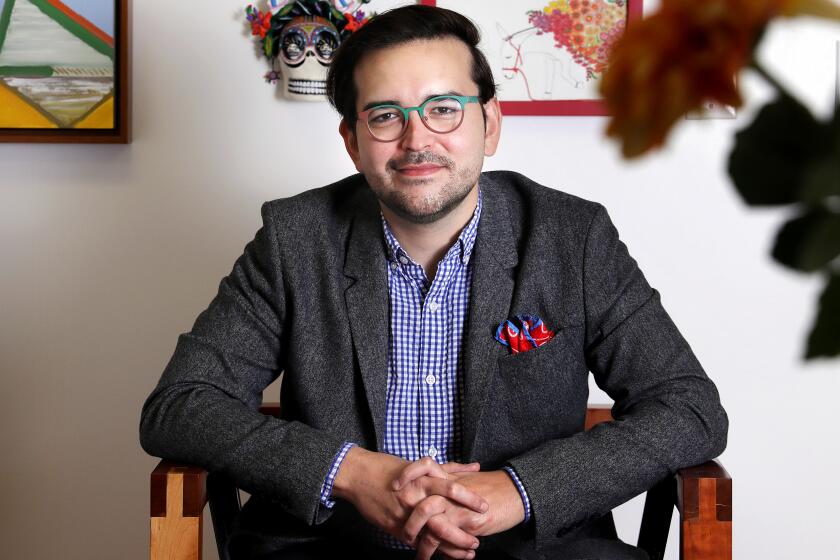Selena isn’t here to tell her story. And Netflix’s new series fails to give her a voice
- Share via
Tejano queen Selena Quintanilla-Pérez had a rags-to-riches story made for the screen. Growing up poor in Corpus Christi, Texas, she learned Spanish from telenovelas and persevered in a male-dominated music industry to become a major star, forever changing the face of pop and Tejano music in the U.S. and Latin America alike. Her murder in 1995, at the age of 23, was the tragic ending to a Cinderella story.
Unfortunately, Netflix‘s biographical drama “Selena: The Series,” which premieres Friday, neither captures nor honors the memory of this remarkable performer as it charts her meteoric rise over nine, 30-minute episodes in the first of two planned seasons.
The Latinx experience chronicled
Get the Latinx Files newsletter for stories that capture the multitudes within our communities.
You may occasionally receive promotional content from the Los Angeles Times.
The story here instead focuses on her father and brother, patriarchs of the Quintanilla family, which oversees her estate. They also executive produced the series. It’s an insurmountable problem for an already formulaic series, created by Moisés Zamora and directed by Hiromi Kamata.
Viewers never get to the bottom of who Selena is, what drives her or what holds her back, because she’s never afforded the same amount of attention or character development as the men behind her career.
The first two episodes establish that Selena’s musician dad, Abraham Quintanilla (Ricardo Chavira), is an ambitious, principled, demanding dreamer. He’s determined to pull his family out of poverty by pushing his kids toward the music stardom that eluded him. He assembles a family band, Selena y Los Dinos, and becomes the driving force behind her success.
‘Please don’t think I think I’m her,’ Christian Serratos says of her headlining role in the Netflix series about Tejano icon Selena. ‘I know I’m not her.’
Brother A.B. (Gabriel Chavarria) is his loyal son. He’s a bass guitarist and budding businessman who struggles to live up to his father’s high expectations. He is torn between his family and starting a new family of his own. His crisis includes songwriting blocks and child-rearing conundrums.
For her part, Selena (played by “The Walking Dead’s” Christian Serratos) is a charismatic presence. When Serratos hits the stage as the singer, the series lights up. She embodies the spirit of the show’s namesake, challenging an old-school Tejano crowd in Mexico by singing a Jody Watley cover song and later wooing young converts with hits like “Como la Flor” and “Bidi Bidi Bom Bom.” Serratos adds her own flair to the role, as Jennifer Lopez did in her depiction of the singer in the 1997 biopic “Selena.”
But unlike Lopez, Serratos hasn’t been given much to work with offstage. Netflix’s Selena is a sweet girl who likes to design clothes, dye her hair and, of course, sing — the series rarely goes deeper than that. Played in her younger years by the effervescent Madison Taylor Baez, when Selena does venture toward moments of self-discovery, the family narrative swiftly hijacks the focus and we’re pulled back into dad’s or A.B.’s story. Rarely do mom Marcella (Seidy Lopez) or sister Suzette (Noemi Gonzalez) get the spotlight.
Even as the series moves into Selena’s teen years and early 20s, it’s her career successes and trials that are used to define her, rather than the kind of characterization that might illuminate her inner life. When she does endeavor to search for who she really is, it’s through the prism of seeking advice from her dad: “Some singers have, like, a costume,” she says to him after he comments on her frequent changes of hair color. “They do their hair different every time or their makeup because that’s who they are. Well, I don’t always know who I am until I am.”
Producer Jaime Dávila wants the industry to know this about Latinos: “We’re not a separate category. We’re part of America. We’re part of the mainstream.”
It’s a sad comment on child stardom, and it underscores the harsh reality that Selena’s not here to tell her own story.
Other issues with the series include clunky dialogue, corny jokes and family scenes that feel overly engineered to promote a wholesome household and business picture. Selena misses out on school while on the road, playing venues across Texas, but apart from missing her friends, she’s fine — just as her father predicted she would be. Her family is not pleased when she carries on with the band’s guitarist, her eventual husband, Chris Pérez (Jesse Posey), but as overbearing as they are, they’re just looking out for her.
“Selena: The Series” does work as a cross-cultural time capsule of the 1980s and ’90s, replete with the original tracks sung by Selena and the band. Crooning Spanish-language classics and singing along to English-language radio hits (Eddie Rabbitt, Kajagoogoo) as they traverse Texas in their battered tour van — or, later, a luxe tour bus, to gigs across the U.S. — they conjure a specific sense of time and place. And yes, the puffy-sleeved jumpsuits, midriff shirts, mall bangs and mullets are fun too.
While the series leaves viewers on the precipice of what’s to come — a deadly encounter with Yolanda Saldívar, Selena’s friend, ex-manager of her fashion boutiques and, ultimately, her murderer — its first nine episodes fail to foster a new understanding of the music icon, leaning hard on the established legend instead.
Selena could sing. But she also had a voice. Too bad she’s not given one here.
More to Read
The complete guide to home viewing
Get Screen Gab for everything about the TV shows and streaming movies everyone’s talking about.
You may occasionally receive promotional content from the Los Angeles Times.









